Visibility used to mean one thing: ranking #1 on Google. Today, that's just one piece of the puzzle. Customers find answers in ChatGPT, get recommendations from Gemini, and see your brand on Meta. The old SEO playbook is incomplete. Your real problem isn't just ranking—it's becoming the definitive answer wherever your customers are looking.
Most guides list generic SEO software, but that's only half the picture. The other half is winning citations inside AI models and running paid campaigns that actually convert. This isn't another list of trendy tools. It’s a focused guide to the best AI platforms for visibility, split into three distinct categories: platforms built for AI-native answers, established SEO suites adapting to AI, and paid platforms using AI to maximize reach.
For each platform, you'll find direct links, screenshots, and an honest breakdown of its ideal use case. I'll show you not just what they do, but which job each one is for—and which ones might be a waste of your budget.
1. AI SEO Tracker
AI SEO Tracker focuses on a problem most other tools ignore: getting your brand cited directly within AI-generated answers on platforms like ChatGPT, Gemini, and Perplexity. Instead of just tracking traditional search rankings, it pinpoints exactly where and how your brand is mentioned inside LLMs. This direct insight allows teams to move beyond legacy SEO tactics and optimize for the emerging landscape of AI-driven discovery. It's one of the best AI platforms for visibility because it connects AI mentions directly to actionable, revenue-focused strategies.
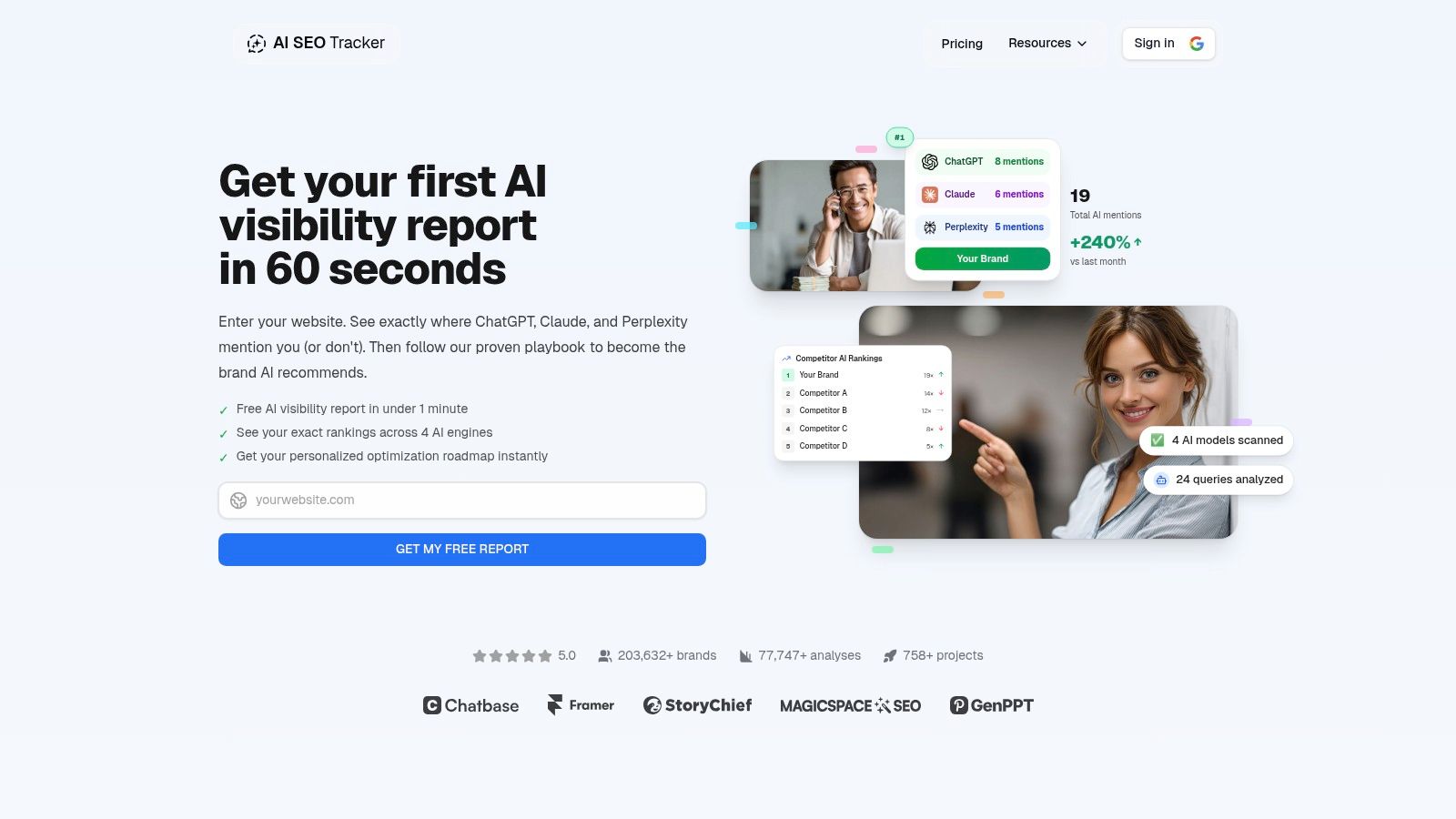
The platform’s core strength is its Page Inspector tool, which translates high-level visibility data into a concrete action plan. It scans any URL to determine precisely what content an LLM can parse, flagging invisible elements or dynamic pricing that AI often misses. From there, it generates prioritized recommendations, such as adding static pricing tables or filling topic gaps to earn more citations. This approach shifts the focus from abstract visibility to tangible fixes.
Key Features and Use Cases
- LLM Citation Monitoring: See which of your pages are cited as sources in AI responses to high-intent customer prompts.
- Actionable Page Inspector: Get a prioritized list of fixes for any URL. For example, a SaaS company used the Inspector to identify that their dynamic pricing was invisible to AI. They added a simple, machine-readable pricing table and saw a 30% increase in citations for "best [software category] pricing" queries within a month.
- Competitive Intelligence: Track your AI share-of-voice against rivals to reveal gaps and opportunities. This moves beyond what is search engine optimization to mastering visibility in a new arena.
- ROI Calculation: An integrated revenue calculator helps estimate the potential return from increased AI-driven traffic, making it easier to justify resource allocation.
Who It's Best For
AI SEO Tracker is built for SaaS marketing teams, SEO strategists, and growth-focused founders who need to prove the value of optimizing for AI search. Its enterprise-ready features, like project-based dashboards and GDPR compliance, make it a reliable choice for B2B companies and the agencies serving them.
- Pros: Directly reveals brand citations in LLMs, provides tactical action plans, and connects AI visibility efforts to measurable ROI.
- Cons: Coverage is limited to the four major LLMs, potentially missing newer models. Advanced fixes may require developer support.
- Pricing: Get a free AI SEO scan and a 14-day free trial. Full pricing plans are available upon inquiry.
Learn more at aiseotracker.com.
2. Semrush
Semrush is a massive marketing toolkit that helps improve visibility across both organic and paid channels. While known for its powerful SEO and SEM features, its integration of AI has made it one of the best AI platforms for visibility for teams needing a single source of truth. The platform uses AI to power its SEO Writing Assistant, which gives real-time content optimization suggestions based on top-ranking competitors.
This toolset is effective for marketing teams managing the entire visibility lifecycle. A content team can use the AI-powered Topic Research tool to generate data-backed content ideas and then use the SEO Content Template to build a brief. The real value comes from its massive dataset, which fuels AI recommendations and provides deep competitive intelligence. For a detailed breakdown, you can learn more about its powerful competitor analysis tools.
The primary drawback is its pricing model. The core subscription is already substantial, and costs can escalate quickly with essential add-ons like Local SEO or Trends.
- Best For: Marketing teams wanting a unified platform for SEO, PPC, and content.
- Key AI Feature: SEO Writing Assistant for real-time content optimization.
- Pricing: Starts at $129.95/month for the Pro plan.
- Website: https://semrush.com
3. Ahrefs
Ahrefs is an SEO titan, renowned for its best-in-class backlink index and powerful competitive analysis tools. While its core strength is traditional SEO data, its recent moves to track AI's impact on search solidify its position among the best AI platforms for visibility. It now provides crucial insights into how brands appear in AI-generated search results, like Google's AI Overviews, which is essential for modern SEO strategy.
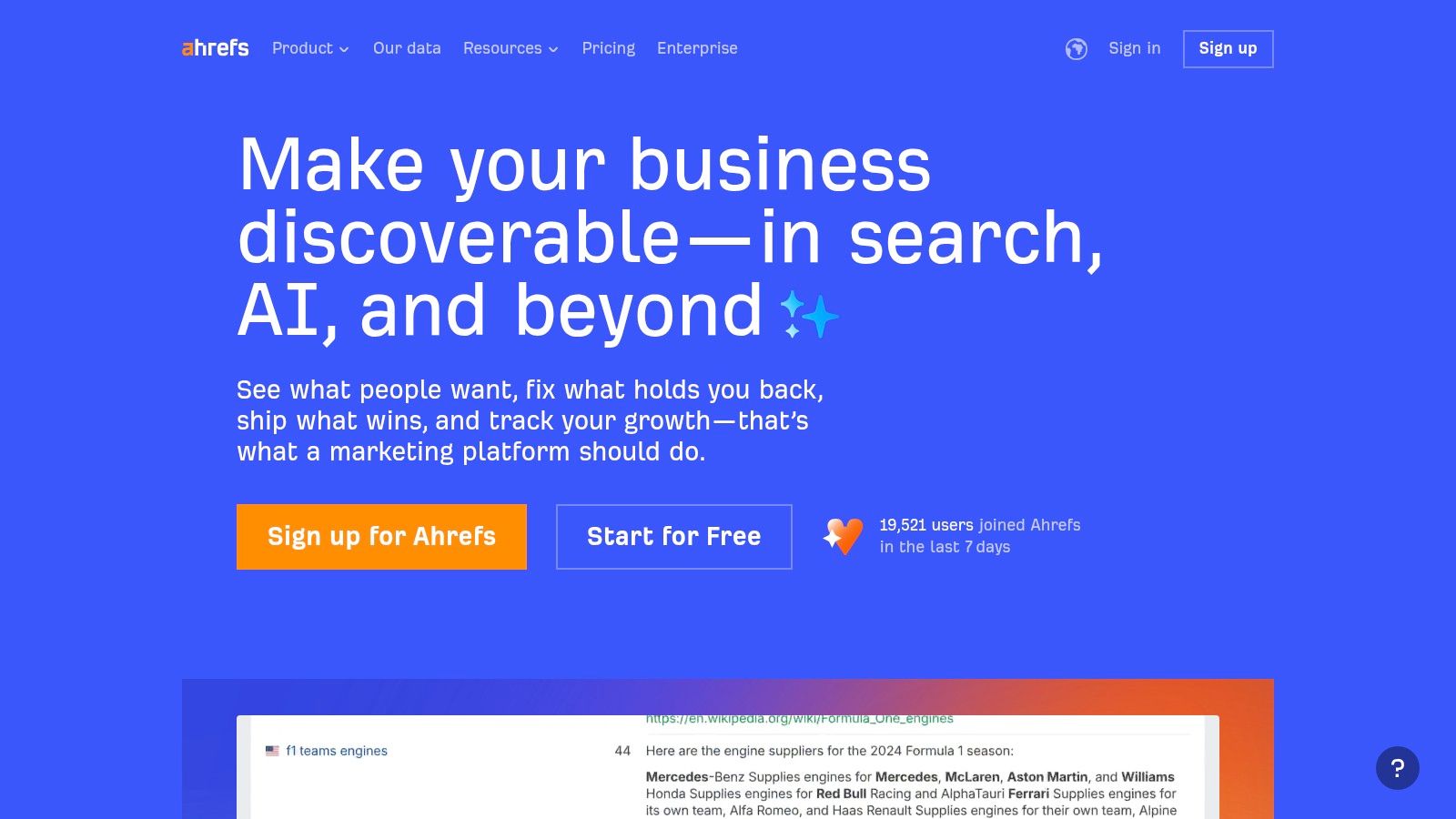
This makes Ahrefs indispensable for SEO managers who need to adapt their strategies for generative AI. For instance, a strategist can use Ahrefs to identify which of their existing content pieces are being cited in AI Overviews and then analyze those pages to replicate their success. The platform's enormous dataset, powered by one of the fastest web crawlers, provides the raw data needed to understand these emerging visibility opportunities before competitors do.
The primary limitation is its cost structure, which can be prohibitive for smaller teams. Pricing scales with usage credits and user seats, and accessing its full suite of features requires a higher-tier plan.
- Best For: SEO teams needing premier backlink data and insights into AI-driven search results.
- Key AI Feature: Tracking website visibility within Google's AI Overviews.
- Pricing: Starts at $99/month for the Lite plan.
- Website: https://ahrefs.com
4. Moz Pro
Moz Pro is a foundational SEO suite that has successfully integrated AI features to enhance its core offerings, making it an excellent choice for those newer to search visibility. It's respected for its educational resources and user-friendly interface, and its recent AI-assisted utilities add a modern layer of intelligence. The platform’s strength is making complex SEO data, like its proprietary Domain Authority, accessible and actionable for SMBs and agencies.
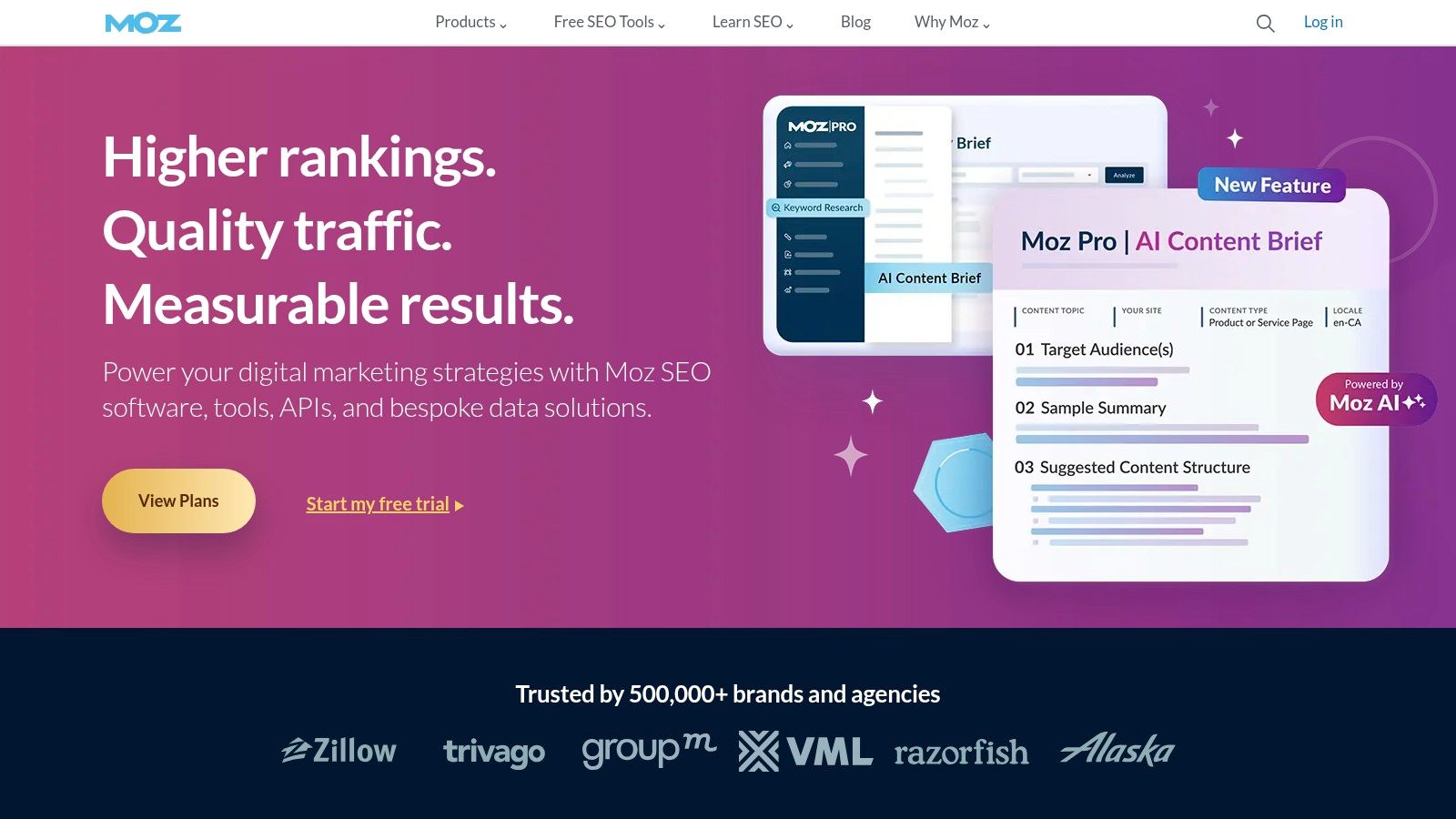
This toolset is particularly effective for those who need reliable core SEO functions without an overwhelming level of complexity. A small business, for example, can use the AI-powered SERP analysis to quickly understand ranking opportunities and then use the on-page optimization checker to implement changes directly. Moz Pro remains one of the best AI platforms for visibility for teams that prioritize a clean user experience and robust educational support alongside powerful tools.
The primary drawback is that its data depth and crawl limits can be less extensive than competitors like Semrush or Ahrefs, which might be a constraint for enterprise-level users.
- Best For: SMBs, agencies, and beginners needing a user-friendly, all-in-one SEO platform.
- Key AI Feature: AI-assisted SERP analysis and keyword suggestions.
- Pricing: Starts at $99/month for the Standard plan.
- Website: https://moz.com
5. Surfer
Surfer is a dedicated, AI-assisted content optimization platform designed to guide writers toward higher organic visibility. Unlike all-in-one suites, Surfer hones in on on-page SEO, using NLP-driven analysis to generate content briefs and topical maps. Its core function is a real-time Content Editor that scores drafts against SERP competitors, making it one of the best AI platforms for visibility for teams focused purely on content execution.
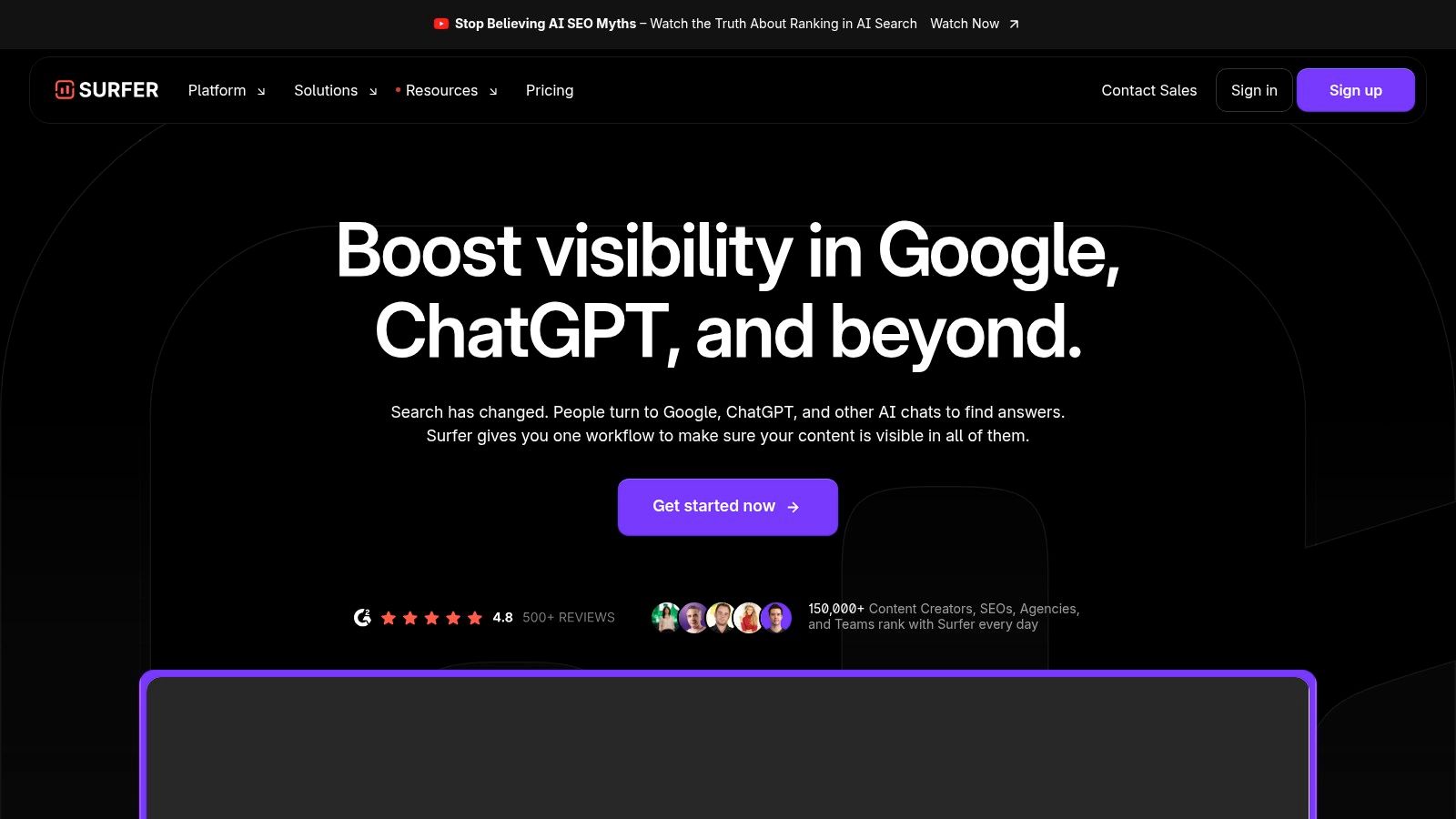
This tool is highly actionable for content teams needing a clear, data-backed path to ranking. A writer can plug a target keyword into the SERP Analyzer, generate a data-rich brief in minutes, and then use the Content Editor's real-time suggestions within Google Docs or WordPress to optimize the draft. The immediate feedback loop closes the gap between strategy and execution, helping writers align their content with what Google already rewards.
The main limitation is its specialized nature; it is not a complete SEO toolkit. Additionally, the costs for AI-generated content are separate from the base subscription, which can lead to unpredictable expenses.
- Best For: Content writers and SEOs who need direct, actionable guidance on optimizing individual pages.
- Key AI Feature: Content Editor provides real-time, NLP-driven optimization scores and keyword suggestions.
- Pricing: Starts at $89/month for the Essential plan.
- Website: https://surferseo.com
6. MarketMuse
MarketMuse is an AI-driven content strategy platform that excels at mapping and building topical authority to drive visibility at scale. Rather than focusing on single keywords, its core strength lies in using AI to model entire topic ecosystems, making it one of the best AI platforms for visibility for organizations with large content libraries. The platform analyzes your existing content to identify gaps and then generates detailed briefs to ensure new articles cover a topic comprehensively.
This toolset is uniquely suited for editorial teams aiming to become the definitive source on a subject. A B2B SaaS company can use the Inventory feature to find high-impact "pillar page" opportunities and then build out supporting cluster content using the AI-generated briefs. Its proprietary Content Score provides a clear roadmap for achieving content depth. You can explore how MarketMuse stacks up against other top-tier AI visibility products.
The primary hurdle for smaller teams is its premium positioning. Pricing for higher-tier plans is sales-assisted and can be a significant investment.
- Best For: Editorial teams and agencies managing large content libraries to build topical authority.
- Key AI Feature: AI-powered topic modeling and Content Score for deep content analysis.
- Pricing: Starts at $149/month for the Standard plan; premium tiers require a quote.
- Website: https://marketmuse.com
7. Similarweb
Similarweb is a competitive intelligence platform that reveals where your competitors gain their online visibility. While not solely an AI tool, its recent integration of AI-powered insights makes it one of the best AI platforms for visibility for teams focused on benchmarking and market analysis. The platform uses AI to distill vast traffic data into actionable recommendations, helping you identify competitor strategies across SEO, PPC, and referral channels.
This tool is most effective for marketers who need a high-level view of the entire digital landscape. For example, a growth marketer can analyze a competitor's traffic sources to find untapped affiliate opportunities, while an SEO manager can see where rivals are winning in organic search. Its strength is providing a broad, multi-channel perspective on digital market share, fueled by a massive dataset. A 2021 study by Similarweb itself confirmed their data correlates strongly with reported company earnings, adding a layer of credibility.
The primary limitation is that many of its most powerful features are locked behind expensive Team or Business plans. The starter tier is useful for a quick overview, but serious analysis requires a significant investment.
- Best For: Marketers needing a broad, multi-channel view of competitor visibility.
- Key AI Feature: AI-powered insights for strategic opportunity analysis.
- Pricing: Offers a free starter plan; paid plans require a quote.
- Website: https://similarweb.com
8. BrightEdge
BrightEdge is an enterprise-grade SEO and content performance platform for large, complex organizations. Its suite of AI-driven tools, including the recently introduced SEO Copilot, focuses on delivering automated insights and content workflows tailored to the scale of enterprise operations. The platform uses AI to analyze massive datasets and provide precise optimization recommendations, making it one of the best AI platforms for visibility for corporations managing multiple domains.
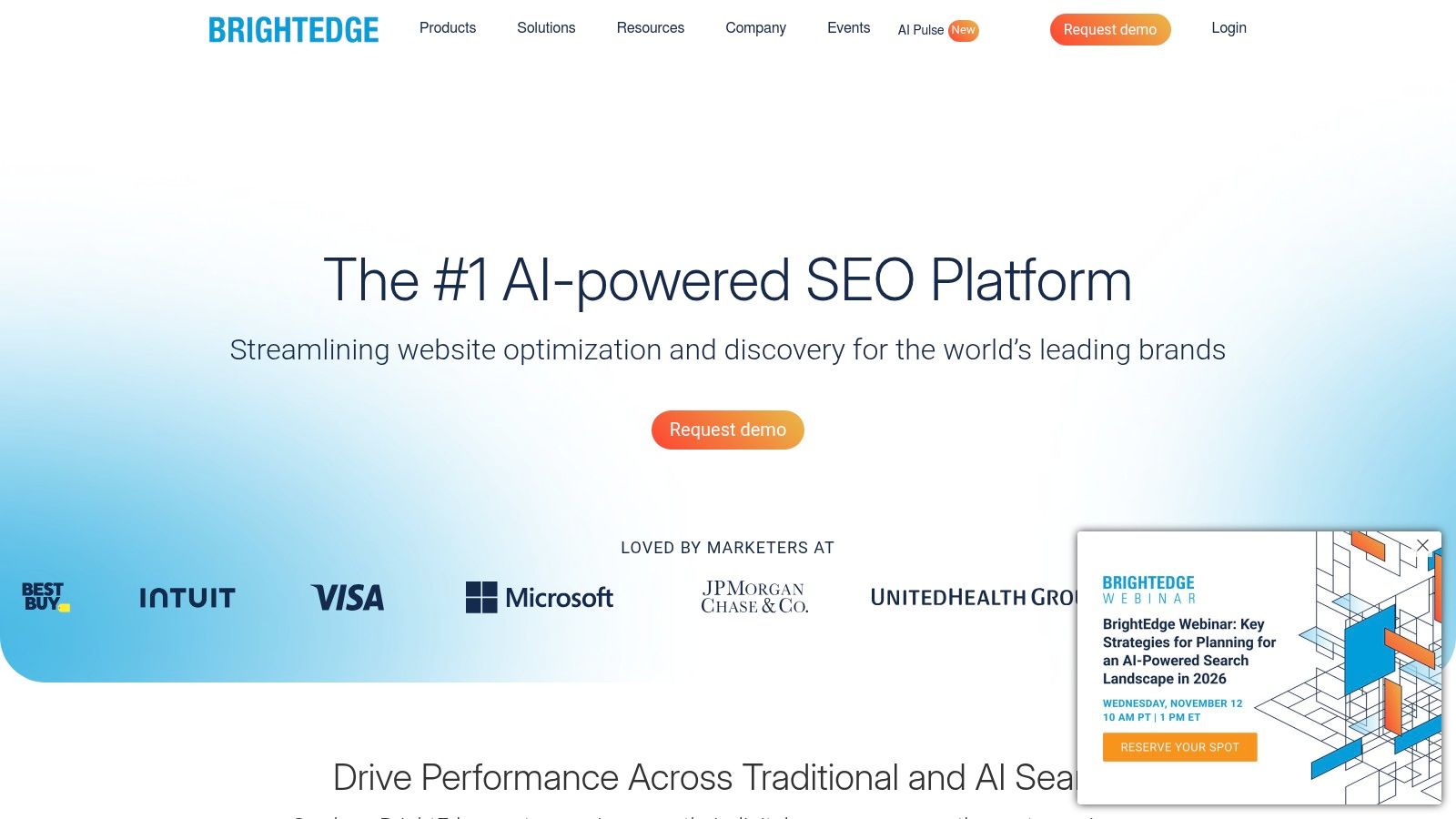
This platform excels where global marketing teams require robust reporting and seamless integrations with their existing tech stack, like Adobe Analytics or Salesforce. For example, a multinational corporation can use BrightEdge to enforce SEO best practices across regional teams while tracking performance against specific business units. Its AI capabilities extend to forecasting the potential impact of content changes, allowing teams to prioritize high-value tasks.
The primary hurdle is accessibility. BrightEdge's custom, sales-assisted pricing model means it is a significant investment and likely overkill for smaller businesses.
- Best For: Enterprise-level organizations managing complex, multi-domain SEO strategies.
- Key AI Feature: SEO Copilot for automated insights and content optimization workflows.
- Pricing: Custom enterprise pricing available upon request via a sales demo.
- Website: https://www.brightedge.com
9. HubSpot (Content Hub / Marketing Hub)
HubSpot integrates AI-powered content and marketing tools directly into its CRM platform, making it one of the best AI platforms for visibility for teams that need to connect marketing efforts directly to revenue. Its AI assistants help generate and remix blog posts, social copy, and emails with built-in SEO recommendations. The true power is its unified nature; you can create content, promote it, and track its influence on a lead's journey all within one system.
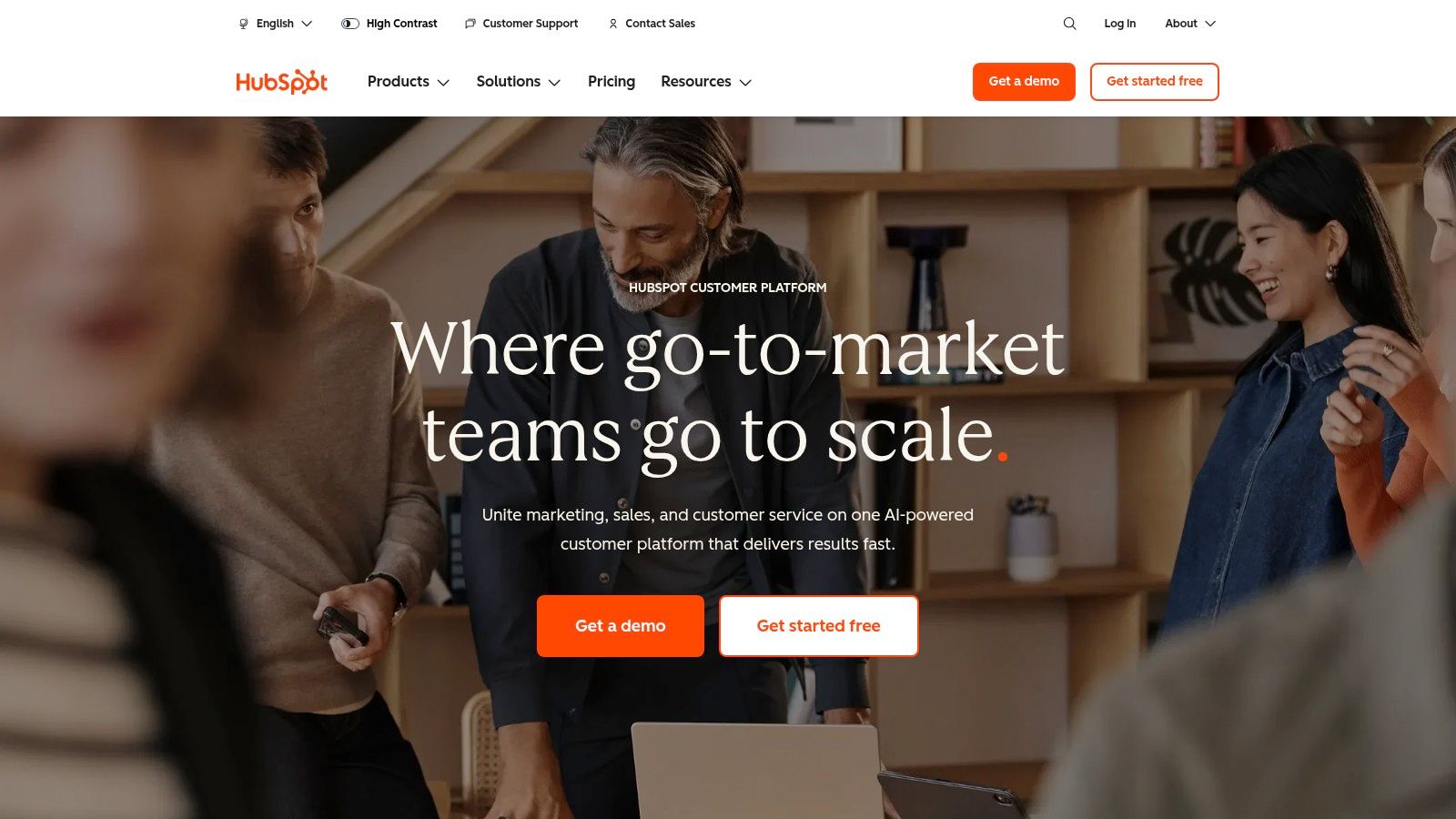
This is ideal for B2B marketing teams that must demonstrate ROI. A marketer can use the AI blog writer to draft an article targeting a specific persona, then use smart content rules to show personalized calls-to-action based on visitor data. All engagement is automatically logged, providing clear attribution from a blog view to a closed deal. It’s not a deep technical SEO crawler, but its strength is the all-in-one approach.
The primary drawback is how costs can escalate. The pricing structure is tied to contact tiers and paid user seats, which can become expensive as a company grows.
- Best For: B2B teams wanting to tie content visibility directly to CRM data and sales outcomes.
- Key AI Feature: AI Content Assistant for creating and remixing SEO-optimized content.
- Pricing: Marketing Hub starts at $800/month (Professional plan) for full functionality.
- Website: https://hubspot.com
10. Google Ads (Performance Max)
Google Ads Performance Max (PMax) uses Google's own AI to automate paid visibility across its entire network. While not a traditional SEO tool, it's one of the best AI platforms for visibility for advertisers seeking rapid, goal-based reach. PMax campaigns use AI to find converting customers across YouTube, Display, Search, Discover, Gmail, and Maps from a single campaign setup.
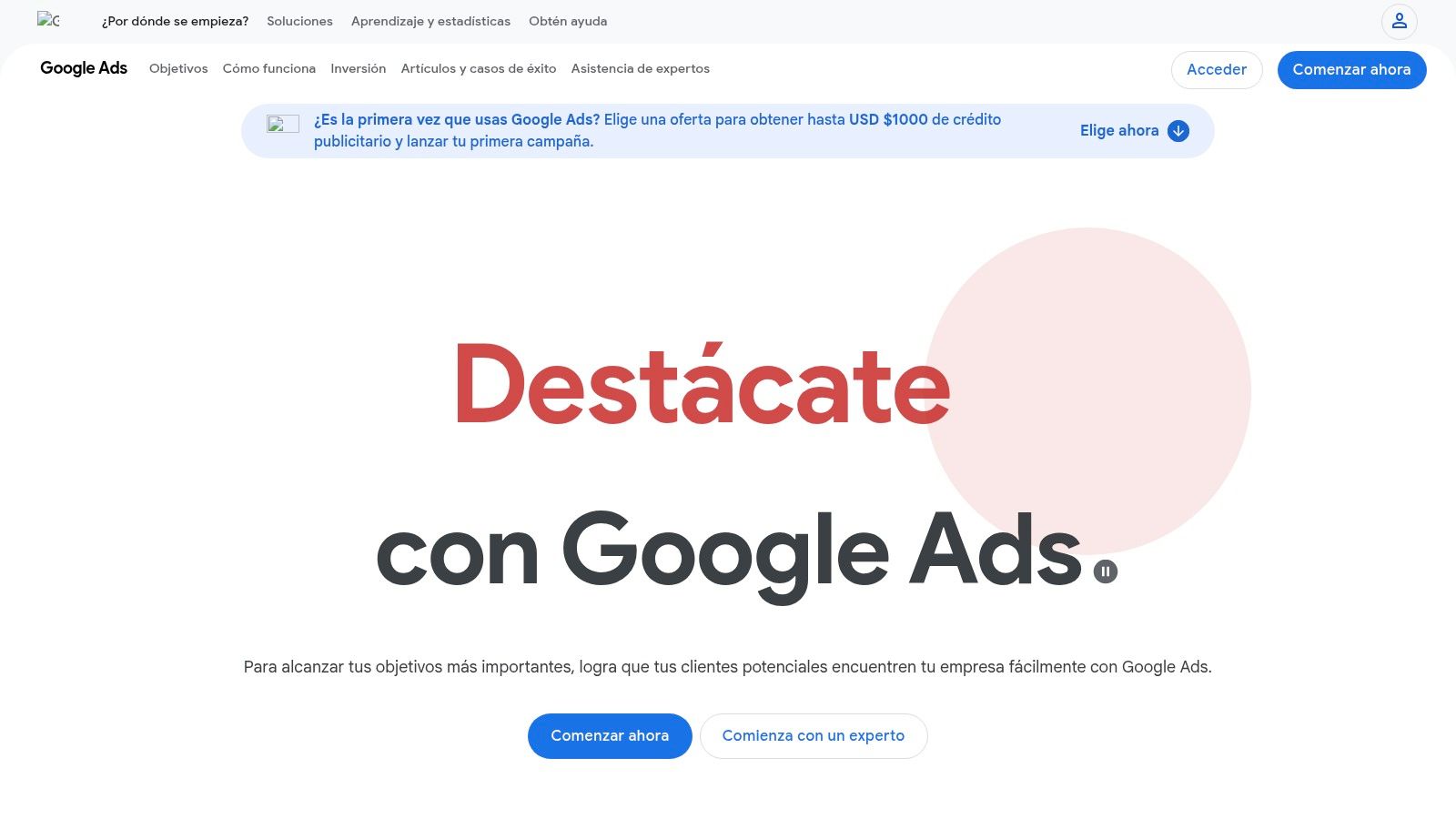
The platform’s strength is its automation of bidding, targeting, and creative delivery. An e-commerce brand can provide its product feed, conversion goals, and creative assets, and Google’s AI handles the rest, optimizing ad placements to maximize online sales. For teams focused on paid acquisition, it's a powerful way to measure your share of voice in advertising.
The primary trade-off is a loss of granular control. Advertisers accustomed to precise keyword bidding may find PMax's "black box" nature frustrating. Success also heavily depends on the quality of the data and creative assets you provide.
- Best For: Advertisers wanting automated, multi-channel reach for specific conversion goals.
- Key AI Feature: Goal-based bidding and audience targeting across the entire Google network.
- Pricing: Pay-per-click/conversion; budget is set by the advertiser.
- Website: https://ads.google.com
11. Meta Ads (Advantage+)
Meta’s Advantage+ suite is a powerful AI-driven visibility engine for consumer-facing brands. Instead of relying on manual targeting, Advantage+ campaigns use machine learning to automate audience discovery and creative delivery across Facebook and Instagram. This makes it one of the best AI platforms for visibility for direct-to-consumer businesses needing to find new customers at scale. The system analyzes real-time conversion signals to dynamically shift budget toward the highest-performing combinations of creative and audiences.
This is particularly effective for e-commerce brands. A home goods store, for example, can upload its product catalog and let Advantage+ find users showing buying signals for similar items, automatically displaying the most relevant products to each person. For service-based businesses, explore this guide on Facebook Ads for Local Businesses Made Simple. The primary drawback is the "black box" nature of the targeting; you trade granular control for automated performance.
- Best For: E-commerce, DTC brands, and lead generation advertisers wanting to scale campaigns.
- Key AI Feature: Automated audience discovery and creative optimization.
- Pricing: Based on ad spend; no platform subscription fee.
- Website: https://www.facebook.com/business/ads/meta-advantage-plus
12. LinkedIn Ads
LinkedIn Ads provides a powerful, specialized platform for B2B visibility, using an unparalleled dataset of professional information. Its primary AI function is embedded within its campaign bidding systems, such as "Maximum Delivery," which automatically adjusts bids to secure the most results for your budget. It ranks as one of the best AI platforms for visibility for brands needing to reach specific professional decision-makers.
This platform is uniquely effective for demand generation and account-based marketing. A SaaS company can target senior software engineers at Fortune 500 companies with Sponsored Content promoting a new integration, letting the AI optimize for clicks or conversions. Its value comes from precision targeting combined with AI-driven delivery, ensuring ad spend is directed toward the most relevant professionals.
The main drawback is its cost. Cost-per-click (CPC) is significantly higher than on consumer-focused platforms, making it less suitable for companies with very tight budgets.
- Best For: B2B companies targeting specific job titles, industries, or company sizes.
- Key AI Feature: Automated bidding strategies (Maximum Delivery) for campaign optimization.
- Pricing: Pay-per-click (CPC), per-impression (CPM), or per-send (CPS) models; no minimum spend.
- Website: https://business.linkedin.com/advertise
Top 12 AI Platforms for Visibility — Feature Comparison
| Product | ✨ Core features | ★ UX / quality | 💰 Price / value | 👥 Target audience | 🏆 Unique selling point |
|---|---|---|---|---|---|
| AI SEO Tracker 🏆 | LLM citation tracking, Page Inspector, SOV dashboards, revenue calculator | ★★★★★ Real-time insights + tactical fixes | 💰 Free scan + 14‑day trial; tiered plans | 👥 SaaS marketing, SEO teams, agencies | ✨ LLM-first visibility + page-level parse & prioritized action plans |
| Semrush | Keyword research, site audit, rank & PPC tools | ★★★★ Broad, mature UI | 💰 Mid–High; add‑ons can raise cost | 👥 Agencies, in‑house SEO/SEM teams | ✨ All-in-one SEO + PPC ecosystem |
| Ahrefs | Site Explorer, backlink index, rank tracker | ★★★★★ Fast crawler; reliable competitive data | 💰 High; scales with usage | 👥 SEO pros, agencies | ✨ Best-in-class backlink & competitive intelligence |
| Moz Pro | Keyword & SERP tools, site audits, MozBar | ★★★★ Beginner-friendly, strong education | 💰 Mid; flexible plans | 👥 SMBs, beginners, agencies | ✨ Easy onboarding + learning resources |
| Surfer | Content Editor, NLP briefs, SERP analyzer | ★★★★ Real-time on‑page guidance for writers | 💰 Mid; pay-as-you-go AI drafting | 👥 Content teams, writers | ✨ SERP-aligned editor + Google Docs/WordPress integration |
| MarketMuse | Topic modeling, inventory, content briefs | ★★★★ Strong for editorial workflows | 💰 Premium; sales-assisted tiers | 👥 Editorial teams, large content libraries | ✨ Topical authority mapping & prioritization at scale |
| Similarweb | Web traffic, channel benchmarking, Ads tracking | ★★★★ Multi-channel competitor insights | 💰 Mid–High; business tiers | 👥 Competitive analysts, growth teams | ✨ Cross-channel visibility & traffic sources |
| BrightEdge | Enterprise SEO, AI recommendations, governance | ★★★★ Enterprise-grade reporting & support | 💰 Enterprise pricing (custom) | 👥 Large enterprises, multi-domain orgs | ✨ Scalable governance + integrations |
| HubSpot (Content/Marketing Hub) | CMS+CRM, AI content, automation & analytics | ★★★★ Integrated UX tying content to revenue | 💰 Scales with seats/contacts; can be costly | 👥 Growth teams, revenue-focused marketers | ✨ Connects visibility to CRM & revenue attribution |
| Google Ads (Performance Max) | AI-driven multi-inventory campaigns | ★★★★ Massive reach; less granular control | 💰 PPC; budget-driven performance | 👥 Advertisers seeking scale & omnichannel reach | ✨ Automated, goal-based multi-network delivery |
| Meta Ads (Advantage+) | Automated FB/IG campaigns, creative optimization | ★★★★ High consumer reach; creative-dependent | 💰 PPC; efficient for DTC & retail | 👥 DTC brands, retailers, performance marketers | ✨ Automated targeting + creative/placement optimization |
| LinkedIn Ads | Sponsored Content, Messaging, precise professional targeting | ★★★★ Best-in-class B2B targeting; higher CPC | 💰 Higher CPCs; CPC/CPM/CPS models | 👥 B2B marketers, recruiters, enterprise sales | ✨ Precise professional audience targeting and forecasting |
Your Next Move: From Reading to Doing
We've explored a dozen powerful platforms. The clear takeaway is that there isn't a single "best" tool. The best AI platforms for visibility are the ones that solve your most urgent business problem right now. The biggest mistake is buying a platform for a problem you don't have yet.
Your decision should hinge on your primary objective. Are you battling to appear in AI-native search results and track brand mentions within models like ChatGPT? A dedicated tool like AI SEO Tracker is non-negotiable. Is your main challenge scaling high-quality, topically-authoritative content? A platform like MarketMuse or Surfer should be your focus.
How to Choose Your Starting Point
Before you commit to a subscription, diagnose your specific visibility gap.
- Define Your Core Goal: Is it organic search, paid acquisition, or AI-native visibility? Be specific. Instead of "more traffic," aim for "get cited as a source in 5% of relevant AI chat queries."
- Audit Your Current Stack: What are you already paying for? Ahrefs and HubSpot, for example, have overlapping features. Identify redundancies to free up budget for a more specialized tool.
- Run a Baseline Analysis: Use free trials to get a snapshot of your current performance. This data provides the business case for any new investment. A small B2B SaaS company might find their core problem isn't keyword ranking, but a complete absence in AI-generated answers for their niche. This immediately points them toward an AI-native visibility tool, not another traditional SEO suite.
Implementing Your Chosen Platform
Once you've selected a tool, treat it as a process change, not just a software addition. Integrating a platform like MarketMuse requires buy-in from your entire content team to shift their workflow from keyword-first to topic-first. The most successful teams designate a clear owner for each platform and schedule regular check-ins to ensure the tool is driving measurable progress toward their core goal.
Navigating this new landscape isn't about having the most tools. It’s about having the right tools and a clear strategy to use them. Start with a focused goal, run your diagnostics, and choose the platform that gives you the most direct path to achieving it.
Ready to find out where your brand stands in the age of AI search? AI SEO Tracker is the only platform designed to show you how you're mentioned, cited, and ranked within AI models. Get your free, instant visibility report and move from guessing to knowing. AI SEO Tracker.

